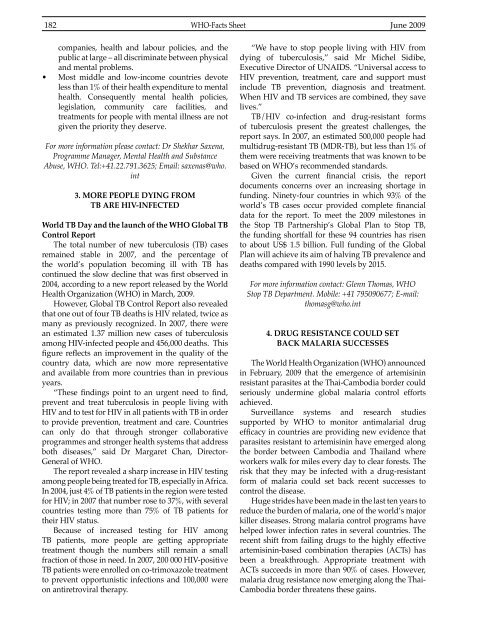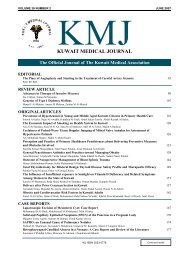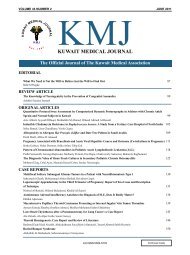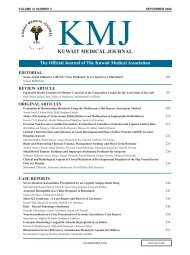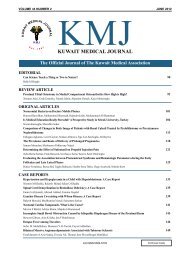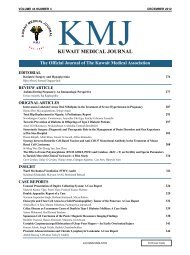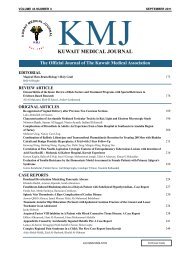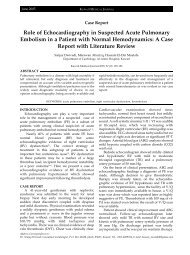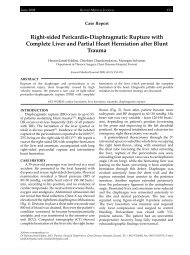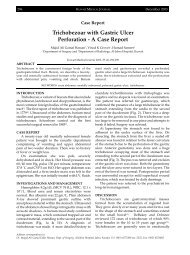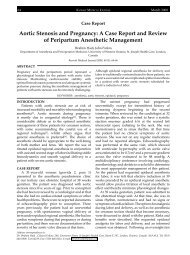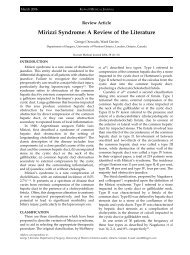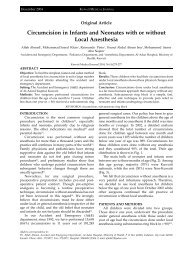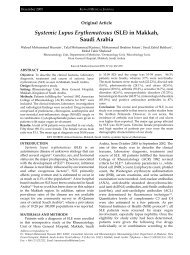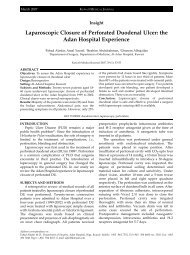June 09-41-2.indd - Kma.org.kw
June 09-41-2.indd - Kma.org.kw
June 09-41-2.indd - Kma.org.kw
You also want an ePaper? Increase the reach of your titles
YUMPU automatically turns print PDFs into web optimized ePapers that Google loves.
182WHO-Facts Sheet <strong>June</strong> 20<strong>09</strong>companies, health and labour policies, and thepublic at large – all discriminate between physicaland mental problems.• Most middle and low-income countries devoteless than 1% of their health expenditure to mentalhealth. Consequently mental health policies,legislation, community care facilities, andtreatments for people with mental illness are notgiven the priority they deserve.For more information please contact: Dr Shekhar Saxena,Programme Manager, Mental Health and SubstanceAbuse, WHO. Tel:+<strong>41</strong>.22.791.3625; Email: saxenas@who.int3. MORE PEOPLE DYING FROMTB ARE HIV-INFECTEDWorld TB Day and the launch of the WHO Global TBControl ReportThe total number of new tuberculosis (TB) casesremained stable in 2007, and the percentage ofthe world’s population becoming ill with TB hascontinued the slow decline that was first observed in2004, according to a new report released by the WorldHealth Organization (WHO) in March, 20<strong>09</strong>.However, Global TB Control Report also revealedthat one out of four TB deaths is HIV related, twice asmany as previously recognized. In 2007, there werean estimated 1.37 million new cases of tuberculosisamong HIV-infected people and 456,000 deaths. Thisfigure reflects an improvement in the quality of thecountry data, which are now more representativeand available from more countries than in previousyears.“These findings point to an urgent need to find,prevent and treat tuberculosis in people living withHIV and to test for HIV in all patients with TB in orderto provide prevention, treatment and care. Countriescan only do that through stronger collaborativeprogrammes and stronger health systems that addressboth diseases,” said Dr Margaret Chan, Director-General of WHO.The report revealed a sharp increase in HIV testingamong people being treated for TB, especially in Africa.In 2004, just 4% of TB patients in the region were testedfor HIV; in 2007 that number rose to 37%, with severalcountries testing more than 75% of TB patients fortheir HIV status.Because of increased testing for HIV amongTB patients, more people are getting appropriatetreatment though the numbers still remain a smallfraction of those in need. In 2007, 200 000 HIV-positiveTB patients were enrolled on co-trimoxazole treatmentto prevent opportunistic infections and 100,000 wereon antiretroviral therapy.“We have to stop people living with HIV fromdying of tuberculosis,” said Mr Michel Sidibe,Executive Director of UNAIDS. “Universal access toHIV prevention, treatment, care and support mustinclude TB prevention, diagnosis and treatment.When HIV and TB services are combined, they savelives.”TB/HIV co-infection and drug-resistant formsof tuberculosis present the greatest challenges, thereport says. In 2007, an estimated 500,000 people hadmultidrug-resistant TB (MDR-TB), but less than 1% ofthem were receiving treatments that was known to bebased on WHO’s recommended standards.Given the current financial crisis, the reportdocuments concerns over an increasing shortage infunding. Ninety-four countries in which 93% of theworld’s TB cases occur provided complete financialdata for the report. To meet the 20<strong>09</strong> milestones inthe Stop TB Partnership’s Global Plan to Stop TB,the funding shortfall for these 94 countries has risento about US$ 1.5 billion. Full funding of the GlobalPlan will achieve its aim of halving TB prevalence anddeaths compared with 1990 levels by 2015.For more information contact: Glenn Thomas, WHOStop TB Department. Mobile: +<strong>41</strong> 795<strong>09</strong>0677; E-mail:thomasg@who.int4. DRUG RESISTANCE COULD SETBACK MALARIA SUCCESSESThe World Health Organization (WHO) announcedin February, 20<strong>09</strong> that the emergence of artemisininresistant parasites at the Thai-Cambodia border couldseriously undermine global malaria control effortsachieved.Surveillance systems and research studiessupported by WHO to monitor antimalarial drugefficacy in countries are providing new evidence thatparasites resistant to artemisinin have emerged alongthe border between Cambodia and Thailand whereworkers walk for miles every day to clear forests. Therisk that they may be infected with a drug-resistantform of malaria could set back recent successes tocontrol the disease.Huge strides have been made in the last ten years toreduce the burden of malaria, one of the world’s majorkiller diseases. Strong malaria control programs havehelped lower infection rates in several countries. Therecent shift from failing drugs to the highly effectiveartemisinin-based combination therapies (ACTs) hasbeen a breakthrough. Appropriate treatment withACTs succeeds in more than 90% of cases. However,malaria drug resistance now emerging along the Thai-Cambodia border threatens these gains.


